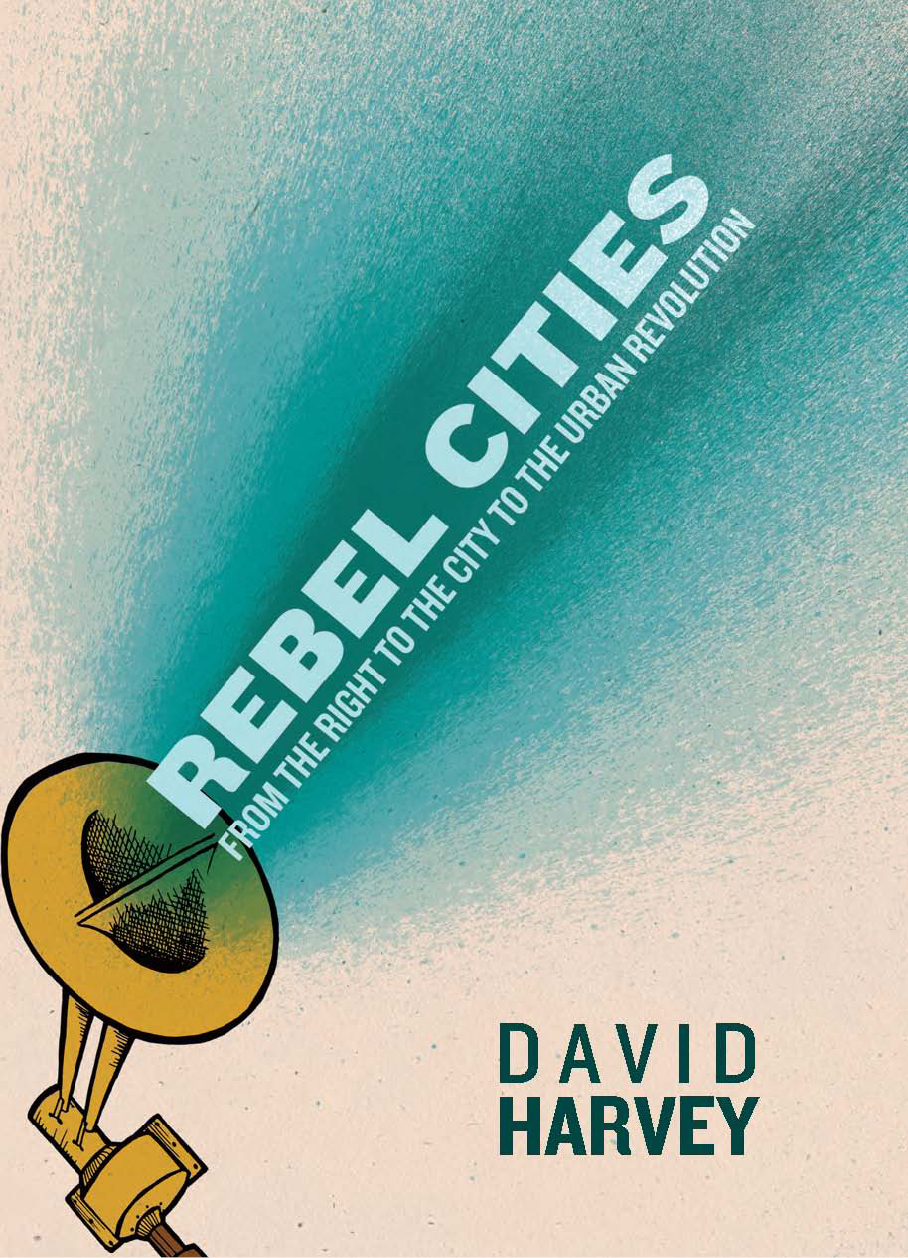David Harvey: Rebel Cities: From the Right to the City to the Urban Revolution (2012–) [EN, ES]
Filed under book | Tags: · activism, capitalism, city, commons, culture, economy, labour, neoliberalism, occupy movement, politics, production, resistance, revolution, social movements, theory of value

“Long before the Occupy movement, modern cities had already become the central sites of revolutionary politics, where the deeper currents of social and political change rise to the surface. Consequently, cities have been the subject of much utopian thinking. But at the same time they are also the centers of capital accumulation and the frontline for struggles over who controls access to urban resources and who dictates the quality and organization of daily life. Is it the financiers and developers, or the people?
Rebel Cities places the city at the heart of both capital and class struggles, looking at locations ranging from Johannesburg to Mumbai, and from New York City to São Paulo. Drawing on the Paris Commune as well as Occupy Wall Street and the London Riots, Harvey asks how cities might be reorganized in more socially just and ecologically sane ways—and how they can become the focus for anti-capitalist resistance.”
Publisher Verso Books, London, 2012
ISBN 1844679047, 9781844679041
216 pages
Reviews: Owen Hatherley (The Guardian, 2012), Ruth Lorimer (Socialist Review, 2012), Lewis Beardmore (Open Democracy, 2012), Justin McGuirk (Art Review, 2012), more.
Rebel Cities (English, updated on 2020-11-28)
Ciudades rebeldes (Spanish, trans. Juanmari Madariaga, 2013, added on 2020-11-28)
Journal of Peer Production, No. 1: Productive Negation (2012)
Filed under journal | Tags: · activism, commons, networks, p2p, peer activism, peer production
The inaugural issue of the Journal of Peer Production was published under the title Critical Studies in Peer Production. It was then hosted by Oekonux, a non-profit organization devoted to the theoretical and practical advancement of peer production. However disagreements about the direction of the journal led to the editorial team deciding to leave Oekonux and relaunch the project under a new name. The Journal of Peer Production is now hosted by the Foundation for P2P Alternatives, a non-profit organization aiming to study the impact of peer to peer technology and thought on society.
The Journal of Peer Production (JoPP) seeks high-quality contributions from researchers and practitioners of peer production. We understand peer production as a mode of commons-based and oriented production in which participation is voluntary and predicated on the self-selection of tasks. Notable examples are the collaborative development of Free Software projects and of the Wikipedia online encyclopedia. Through the analysis of the forms, operations, and contradictions of peer producing communities in contemporary capitalist society, the journal aims to open up new perspectives on the implications of peer production for social change.
Contributions by George Dafermos, Stefano De Paoli, Vincenzo D’Andrea and Maurizio Teli, Francesca Musiani, Michel Bauwens, Jakob Rigi, Christian Siefkes, Jean Zin, Stefan Meretz, Maurizio Teli, Toni Prug
Editors: Mathieu O’Neil (coordinator), Athina Karatzogianni, George Michaelides, Johan Söderberg, Maurizio Teli, Nathaniel Tkacz
Published in July 2012
View online (HTML articles)
Comment (0)Michael Hardt, Antonio Negri: Declaration (2012) [English/Russian]
Filed under pamphlet | Tags: · commons, neoliberalism, occupy movement, protest, resistance, social movements

This is not a manifesto. Manifestos provide a glimpse of a world to come and also call into being the subject, who although now only a spector must materialize to become the agent of change. Manifestos work like the ancient prophets, who by the power of their vision create their own people. Today’s social movements have reversed the order, making manifestos and prophets obsolete. Agents of change have already descended into the streets and occupied city squares, not only threatening and toppling rulers but also conjuring visions of a new world. More important, perhaps, the multitudes, through their logics and practices, their slogans and desires, have declared a new set of priciples and truths. How can their declaration become the basis for constituting a new and sustainable society? How can those priciples and truths guide us in reinventing how we relate to each other and our world? In their rebellion, the multitudes must discover the passage from declaration to constitution.
Self-published on 8 May 2012
ISBN: 9780786752911
98 pages
commentary (by Nicholas Mirzoeff)
PDF (PDF; updated on 2013-2-5)
View online, cont. (Russian translation in progress, added on 2013-2-5)

